Ditapis dengan
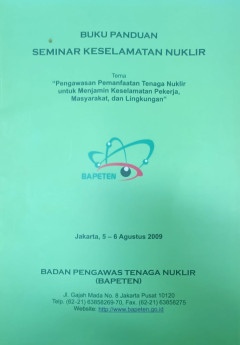
Buku Panduan SKN tema Pengawasan Pemanfaatan Tenaga Nuklir untuk Menjamin Kes…
Buku panduan ini diterbitkan pada 2009 dalam rangka acara SKN bertema Pengawasan Pemanfaatan Tenaga Nuklir untuk Menjamin Keselamatan Pekerja, Masyarakat, dan Lingkungan. Dalam buku ini dijelaskan tentang aturan tata tertib seminar, daftar penyaji maklah dan abstrak.
- Edisi
- -
- ISBN/ISSN
- -
- Deskripsi Fisik
- ii,59p.:illus.;26 cm.
- Judul Seri
- -
- No. Panggil
- 354.4709598 BAP B
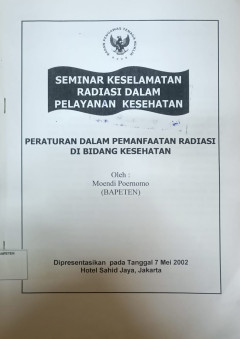
Seminar Keselamatan Radiasi Dalam Pelayanan Kesehatan: Peraturan Dalam Pemanf…
Artikel ini merupakan terbitan dalam acara seminar keselamatan radiasi dalam pelayanan kesehatan. Pokok bahasan terkati pemanfaatan radiasi di bidang kesehatan. Ditulis oleh Moendi Poernomo.
- Edisi
- -
- ISBN/ISSN
- -
- Deskripsi Fisik
- i,16p.;25 cm.
- Judul Seri
- -
- No. Panggil
- 344.5397 POE S
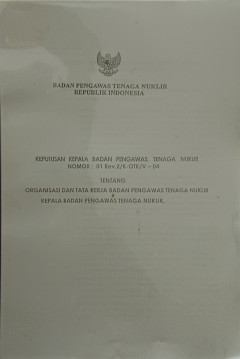
Keputusan Kepala Badan Pengawas Tenaga Nuklir Nomor: 01 Rev.2/K-OTK/V-04 Tent…
Text ini berisikan Keputusan Kepala Badan Pengawas Tenaga Nuklir Nomor: 01 Rev.2/K-OTK/V-04 Tentang Organisasi Dan Tata Kerja Badan Pengawas Tenaga Nuklir Kepala Badan Pengawas Tenaga Nuklir. (AR)
- Edisi
- -
- ISBN/ISSN
- -
- Deskripsi Fisik
- 48 p. : Illus. ; 30 cm
- Judul Seri
- -
- No. Panggil
- 659.2 BAP N
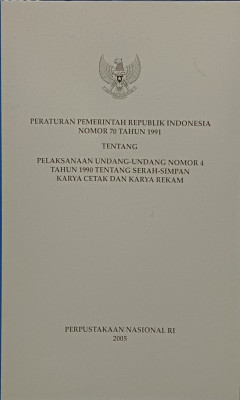
Peraturan Pemerintah RI Nomor 70 Tahun 1991 Tentang Pelaksanaan UU No. 4/1990…
Text ini berisikan Peraturan Pemerintah RI Nomor 70 Tahun 1991 Tentang Pelaksanaan UU No. 4/1990 Tentang Serah-Simpan Karya Cetak dan Karya Rekam. (AR)
- Edisi
- -
- ISBN/ISSN
- 9799316537
- Deskripsi Fisik
- 28 p. : illus. ; 18 cm
- Judul Seri
- -
- No. Panggil
- 070.026 PER p
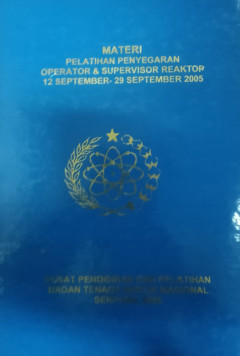
Materi Pelatihan Penyegaran Operator dan Supervisor Reaktor, 12-19 September …
Dokumen ini adalah materi tentang pelatihan penyegaran operator dan supervisor reaktor. Pokok bahasan mencakup di antaranya fisika reaktor, perpindahan panas, proteksi radiasi, keselamatan reaktor dan pengawasan. Selain itu, karakteristik desain operaasi reaktor, sistem pendingin RSG-GAS, sistem instrumentasi, sistem monitor, ventilasi, listrik dan penanganan panas RSG-GAS. Pokok bahasan lainny…
- Edisi
- -
- ISBN/ISSN
- -
- Deskripsi Fisik
- vi,205p.:illus.;28 cm.
- Judul Seri
- -
- No. Panggil
- 6107.346 BAT M
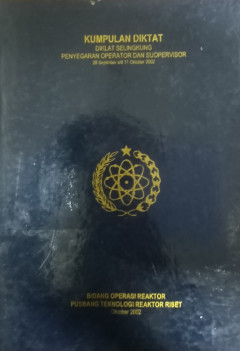
Kumpulan Diktat Selingkung Penyegaran Operator dan Supervisor, 28 September -…
Dokumen ini adalah kumpulan diktat penyegaran operator dan supervisor. Pokok bahasan mencakup sistem pendingin RSG-GAS dan penunjangnya, dasar-dasar keselamatan nuklir, menajemen bahan bakar RSG-GAS, sistem ventilasi, skala kecelakaan nuklir, kolam reaktor dan sistem proteksi RSG-GAS. Masih banyak materi-materi penting lainnya terkait penyegaran operator dan supervisor ini.
- Edisi
- -
- ISBN/ISSN
- -
- Deskripsi Fisik
- iii,289p.:illus.;28 cm.
- Judul Seri
- -
- No. Panggil
- 6107.346 BAT K
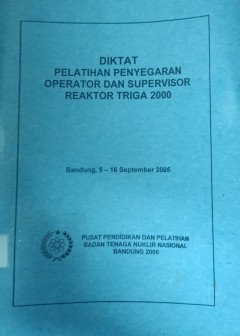
Diktat Pelatihan Penyegaran Operator dan Supervisor Reaktor Triga 2000, Bandu…
Bahan ajar ini membahas tentang reaktor triga. Pokok bahasan setiap bab di antaranya fisika reaktor, perpindahan kalor, proteksi radiasi, keselamatan reaktor, pengawasan, dan karakteristik desain reaktor triga 2000. Untuk reaktor triga juga membahas terkait sistem pendingin, intstrumentasi dan kendali, sistem bantu, dan manajemen operasi. Selain itu juga terkait kedaruratan nuklir, proteksi fis…
- Edisi
- -
- ISBN/ISSN
- -
- Deskripsi Fisik
- vi,135p.:illus.;28 cm.
- Judul Seri
- -
- No. Panggil
- 6107.346 BAT D

Radiation Safety ACT 1975 Diagnostic X-Ray Equipment Compliance Testing Workb…
This book is about Radiation Safety ACT 1975 Diagnostic X-Ray Equipment Compliance Testing Workbook 1 Mobile Radiographic Equipment. (AR)
- Edisi
- -
- ISBN/ISSN
- -
- Deskripsi Fisik
- 65p.:illus.;29,5cm.
- Judul Seri
- -
- No. Panggil
- 616.07575 THE R
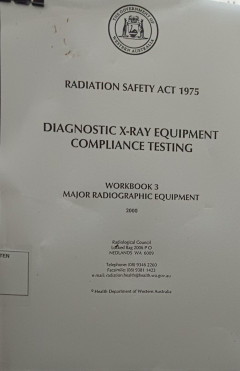
Radiation Safety ACT 1975 Diagnostic X-Ray Equipment Compliance Testing Workb…
This workbook is one of a series prepared by a working group of the Radiological Council, the statutory body established under the Western Australian Radiation Safety Act 1975. (AR)
- Edisi
- -
- ISBN/ISSN
- -
- Deskripsi Fisik
- 69p.:illus.;29,5cm.
- Judul Seri
- -
- No. Panggil
- 616.07575 THE R (2)

International Standard IEC 60601-2-1 amandement 1 Medical equipment part 2-1:…
This text is about International Standard IEC 60601-2-1 amandement 1 Medical equipment part 2-1: Particular requirements for the safety of electron accelerators in the range 1 MeV to 50 MeV. (AR)
- Edisi
- -
- ISBN/ISSN
- -
- Deskripsi Fisik
- -p.:illus.;30cm.
- Judul Seri
- -
- No. Panggil
- 616.07575 IEC I
 Karya Umum
Karya Umum  Filsafat
Filsafat  Agama
Agama  Ilmu-ilmu Sosial
Ilmu-ilmu Sosial  Bahasa
Bahasa  Ilmu-ilmu Murni
Ilmu-ilmu Murni  Ilmu-ilmu Terapan
Ilmu-ilmu Terapan  Kesenian, Hiburan, dan Olahraga
Kesenian, Hiburan, dan Olahraga  Kesusastraan
Kesusastraan  Geografi dan Sejarah
Geografi dan Sejarah